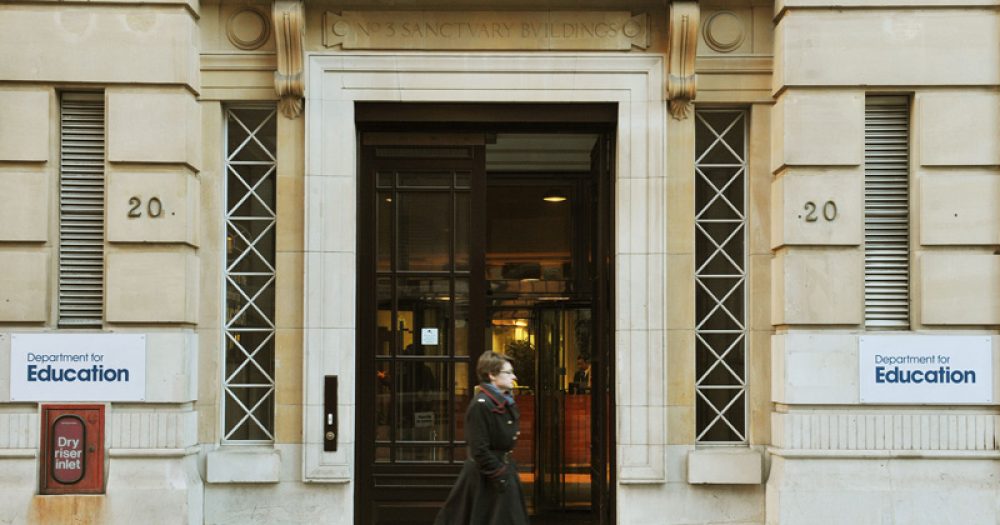The Department for Education has dismissed the findings of a damning Ofsted report on school funding, claiming it is “based on a very small and unrepresentative sample”.
The watchdog’s study, which was published this morning, is based on a survey of 201 headteachers, telephone interviews with 18 other school leaders, focus groups of inspectors and research visits to 16 schools.
We recognise schools have faced cost pressures in recent years
It found that schools were “feeling the pressure” of real-terms cuts in funding, and warned plans by the government to inject £7.1 billion into the schools budget will still leave leaders grappling with gaps in other local authority services.
The publication of the full report comes after Ofsted inadvertently published and then took down a blog post by chief inspector Amanda Spielman, which warned of impact on the breadth of curriculum, teacher workload and SEND support in some schools as a result of funding pressures.
But a DfE spokesperson today dismissed the report, and insisted all schools would receive an increase in funding next year.
“This report is based on a very small and unrepresentative sample of schools,” the spokesperson said.
“We recognise schools have faced cost pressures in recent years. That is why we are providing the biggest funding boost for schools in a decade, giving every school more money for every child.”
But Paul Whiteman, the general secretary of school leaders’ union NAHT, said the report was “impossible for the government to ignore”.
“In this new report Ofsted says clearly that schools are ‘under significant financial pressure’. We can be in no doubt that Ofsted thinks school funding is insufficient and that this is having a negative impact on young people,” he said.
“So close to the budget, it will be difficult for the new chancellor to talk about ‘record levels of school funding’ when the government’s own school inspectorate reports that 42 per cent of primary leaders and 48 per cent of secondary leaders say that their schools will be in debt by the end of the 2019–20 budget year.”
In her blog post, Spielman said schools were working in a “challenging financial environment” following real-terms cuts of around 8 per cent over the past decade.
However, she has also faced criticism for her comments about financial management in schools.
“Poor decision-making in response to financial pressure is potentially harmful to quality of education,” she wrote. “But this could be as big an issue when funding is increased. Funding can still be squandered when it is plentiful, meaning taxpayers’ money could be wasted for little benefit.”
Whiteman said he disagreed with the chief inspector that schools have made poor choices about funding.
“School leaders do not ‘squander’ money. They are infinitely resourceful at getting the most out of every penny.
“They have to be, because the school funding picture in the UK is anything but ‘plentiful’.”








So now we have the DfE arguing with Ofsted about much-needed research, and because the DfE doesn’t like what they read, they shut down what evidence there is, as not representative of the teaching profession, rather than consider the details and learn from some of the lessons of the past…
If all teachers only fill their kettles half full how long will it take for the taxpayer to recoup the expenditure needed to sustain this futile nonsense perpetuated by the taxpayer funded DfE vs taxpayer funded OFSTED?
If all schools never used a colour photocopy again how long would it take to net off this storm in a tea cup?
If two Government departments can’t agree on their media message for one month how many bottles of champagne will Lord Agnew never have to deliver?
This is expensive stuff. No one under has learned anything let alone any children.
It is wasteful decadent hyperbole for individual gain. Shame on both houses. Lord Agnew all is forgiven! Return and sort these posturing wasteful mandarins out!
Oh the irony!
I agree the sample size is very small and probably not statistically representative of schools a whole. However, shouldn’t this spark further research rather than an outright rejection of the findings and a closure of the debate. Everyone knows that OFSTED behave in an unscientific way leading to a high degree of variability and unpredictability. But they behave like that in everything they do. Why suddenly is this report rejected? Mary Shelley’s, Frankenstein’s monster springs to mind.
The DfE dismisses the research because the sample was too small and unrepresentative. Would it have been so scrupulous if Ofsted’s findings had been the other way? And will it stop using a small and unrepresentative sample of free schools (the successful ones) to promote free schools as a whole?
DfE is happy to support league tables for school with cohorts well under 30 children. Raise-online et al a massive expense nationally when again primary schools up and down the land have one form entry around 30 children a year. A statistical nonsense “based on a very small and unrepresentative sample”.
The lack of rigour and transparency from both bodies is woeful.
The DofE and Ofsted need to take a look at the change in modern day culture and expectation that we have of children both in school and at home. It should no longer be about results but about the students enjoying education and being able to apply it to their future!
In the past, HM Treasury (under Chancellors from both major parties) could *legitimately* be accused of playing a “double game” : encouraging the immigration of “skilled” (intellectually-enabled and experienced) workers (teachers/leaders) educated at the expense of taxpayers overseas; squeezing the maximum outcomes out of the UK’s education system with the minimum of acceptable inputs.
Think, carefully, about it: that “expert” from India or China or Kenya or Hong Kong or Singapore or Jamaica or where-ever is only allowed “in” if there is *not* a sufficiently well-educated Brit to take the job…
…and educating the Brit to take the job requires decent CPD, a decent degree, decent A-Levels, decent GCSEs, decent Primary education and decent EYFS education…
…expensive (as your article, above, highlights!)…
So, which is best? Importing employees for the public services (degrading public services overseas and gracefully thanking taxpayers overseas) or creating our own?
And… what about the “lead time”?
Might a short-term crisis in recruitment *now* mean lowering the thresholds for importing skilled workers today: granting them VISAs for jobs paying MPS rather than just granting VISAs for those paying UPS or higher?
If so, what to do when more Brit employees are ready for those MPS roles? Do the imports then have to be sent back? What if they’ve married Brits in the interim? What if they’ve settled?
It’s all a bit more *complicated* than perhaps it might first appear…
Still… do imagine the UK taxpayer must also pay to educate and train a few who end up overseas too…
So, has anyone ever made a ” Freedom of Information Request” to get properly contextualized and stratified data for the net flows of teachers: imports and exports?